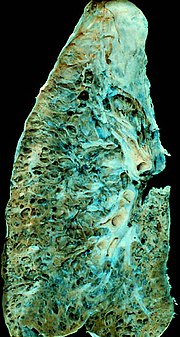lipid component of surfactant, dipalmitoylphosphatidylcholine (DPPC), reduces surface tension. As a medication, pulmonary surfactant is on the WHO Model...
23 KB (2,661 words) - 00:24, 19 May 2024
Pulmonary surfactant is used as a medication to treat and prevent respiratory distress syndrome in newborn babies. Prevention is generally done in babies...
13 KB (1,064 words) - 04:21, 4 January 2024
include pulmonary hypertension, respiratory failure, pneumothorax, and lung cancer. Causes include environmental pollution, certain medications, connective...
31 KB (3,108 words) - 22:34, 8 September 2024
lung disease. People often benefit from pulmonary rehabilitation and supplemental oxygen. Certain medications like pirfenidone (Esbriet) or nintedanib...
71 KB (7,921 words) - 16:50, 1 November 2024
Interstitial lung disease (redirect from Interstitial pulmonary diseases)
the alveoli (air sacs) of the lungs. It concerns alveolar epithelium, pulmonary capillary endothelium, basement membrane, and perivascular and perilymphatic...
28 KB (2,840 words) - 15:10, 10 September 2024
Infant respiratory distress syndrome (redirect from Surfactant deficiency)
syndrome in premature infants caused by developmental insufficiency of pulmonary surfactant production and structural immaturity in the lungs. It can also be...
38 KB (4,369 words) - 08:57, 2 November 2024
Respiratory disease (redirect from Pulmonary diseases)
pharyngitis to life-threatening diseases such as bacterial pneumonia, pulmonary embolism, tuberculosis, acute asthma, lung cancer, and severe acute respiratory...
33 KB (3,494 words) - 14:00, 28 October 2024
Pulmonary drug delivery is a route of administration in which patients use an inhaler to inhale their medications and drugs are absorbed into the bloodstream...
27 KB (3,026 words) - 21:15, 9 August 2024
A pulmonary contusion, also known as lung contusion, is a bruise of the lung, caused by chest trauma. As a result of damage to capillaries, blood and...
68 KB (8,110 words) - 00:36, 13 October 2023
ventilation, surfactant instillation, pulmonary vasodilators, and extracorporeal membrane oxygenation. iNO is the preferred medication for PPHN due to...
15 KB (1,716 words) - 18:21, 13 August 2023
Dipalmitoylphosphatidylcholine (lecithin) is a major component of the pulmonary surfactant, and is often used in the lecithin–sphingomyelin ratio to calculate...
11 KB (1,198 words) - 01:34, 9 September 2024
Oxygen toxicity (redirect from Pulmonary oxygen toxicity)
progressively, and medications such as bronchodilators and pulmonary surfactants may be used. Divers manage the risk of pulmonary damage by limiting exposure...
117 KB (11,925 words) - 12:30, 2 November 2024
Metered-dose inhaler (section Surfactant lipids)
for treating asthma, chronic obstructive pulmonary disease (COPD) and other respiratory diseases. The medication in a metered dose inhaler is most commonly...
21 KB (2,474 words) - 22:36, 30 October 2024
liquid medication used to treat infant respiratory distress syndrome. It is a pulmonary surfactant for infants who lack enough natural surfactant in their...
8 KB (657 words) - 11:25, 31 March 2021
cells which form the barrier of the microscopic air sacs of the lungs, surfactant dysfunction, activation of the immune system, and dysfunction of the body's...
53 KB (5,990 words) - 09:48, 31 July 2024
Oleyl alcohol (category Non-ionic surfactants)
Bouveault in 1904 and subsequently refined. It has uses as a nonionic surfactant, emulsifier, emollient and thickener in skin creams, lotions and many...
5 KB (331 words) - 02:22, 17 September 2024
hyaline membranes. These hyaline membranes are made up of dead cells, surfactant, and proteins. The hyaline membranes deposit along the walls of the alveoli...
16 KB (1,763 words) - 18:52, 18 July 2024
List of antibiotics (redirect from Medications used to treat MRSA)
Daptomycin Cubicin Gram-positive organisms, but is inhibited by pulmonary surfactant so less effective against pneumonias Binds to the membrane and cause...
29 KB (747 words) - 11:49, 12 September 2024
cortisol between weeks 30 and 32 initiates production of fetal lung pulmonary surfactant to promote maturation of the lungs. In fetal lambs, glucocorticoids...
78 KB (8,617 words) - 11:01, 6 November 2024
oleic acid to give an oxazoline, which protonates to give a cationic surfactant. Like some other nitrated organic compounds, nitroethane is also used...
9 KB (647 words) - 18:46, 7 May 2024
"Neonatal pneumothorax: symptoms, signs and timing of onset in the post-surfactant era". The Journal of Maternal-Fetal & Neonatal Medicine. 35 (25): 5438–5442...
66 KB (7,504 words) - 19:02, 30 October 2024
"Fetal lung development and the influence of glucocorticoids on pulmonary surfactant". Journal of Steroid Biochemistry. 8 (5): 463–470. doi:10.1016/0022-4731(77)90248-5...
26 KB (2,398 words) - 16:08, 24 January 2024
and other commonly used medications, such as insulin, dopamine, and allopurinol have also been effective in reducing pulmonary edema in animal models but...
30 KB (4,283 words) - 18:32, 15 October 2024
problems caused by developmental disorders, growth abnormalities, and surfactant-related disorders; other categories that aren't specific to infancy, such...
6 KB (550 words) - 19:35, 11 October 2023
alveolar wall permeability, as well as decreased secretion of lung surfactants. These effects cause the majority of the respiratory symptoms. However...
288 KB (33,185 words) - 16:47, 7 November 2024
characterized by abnormal blood vessels in the lungs that cause highly elevated pulmonary blood pressure and an inability to effectively oxygenate and remove carbon...
13 KB (1,404 words) - 13:37, 27 October 2023
with novel antiviral medications in adults are promising but it remains unclear if the same benefit will be present. Surfactant had favorable effects...
53 KB (5,627 words) - 15:24, 8 November 2024
Breastfeeding difficulties (section Medications)
harm the baby also if the mother has untreated pulmonary tuberculosis, is taking certain medications that suppress the immune system. has HIV, or uses...
41 KB (4,554 words) - 13:00, 10 November 2024
Aspirated water that reaches the alveoli destroys the pulmonary surfactant, which causes pulmonary edema and decreased lung compliance, compromising oxygenation...
126 KB (13,722 words) - 18:30, 8 November 2024























